Graduating is an achievement worth celebrating – but what comes next?
As a graduate, you’re stepping into the job market with a wealth of knowledge and enthusiasm. But without the right CV, you might find yourself stuck on the sidelines instead of getting your foot in the door.
This guide, complete with Graduate CV examples, will help you highlight your education, skills, and any experience you’ve gained along the way (yes, your part-time bar job counts). Let’s get started on building a CV that puts you on the career ladder.
Graduate CV example
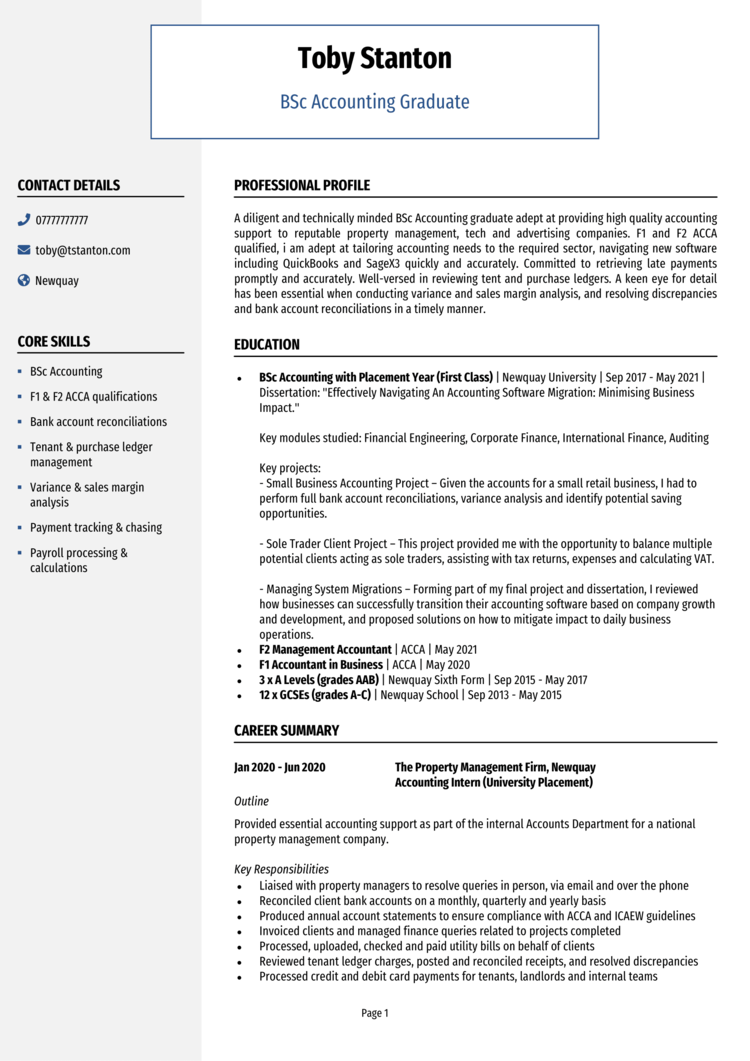
Engineering Graduate CV
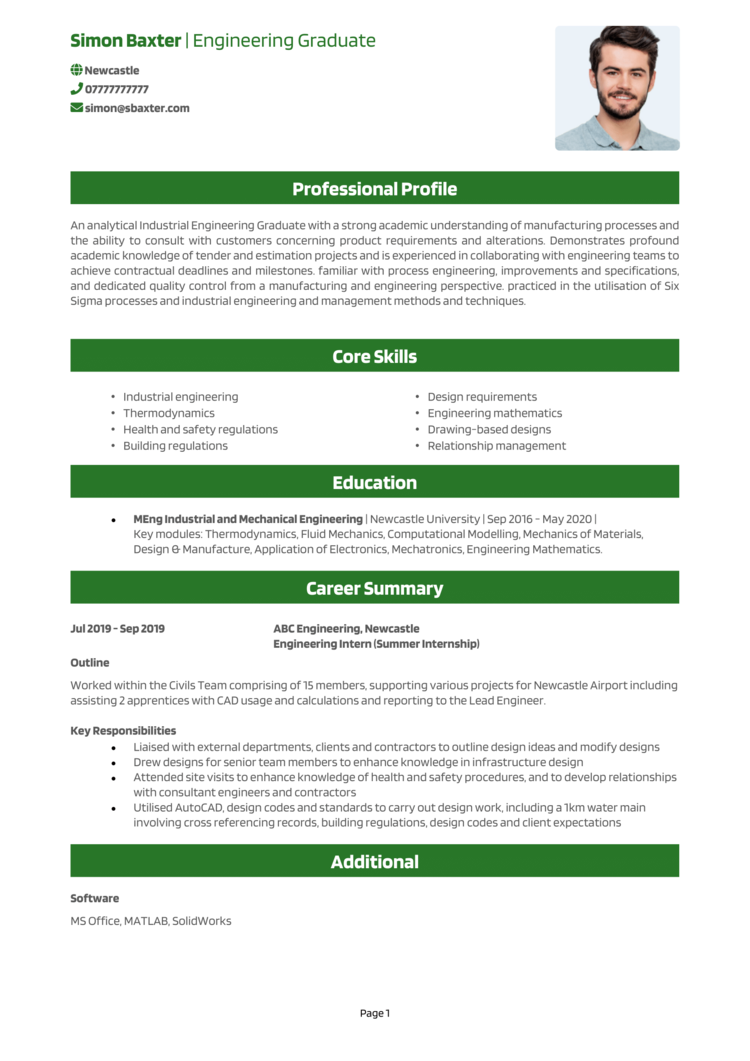
Finance Graduate CV example
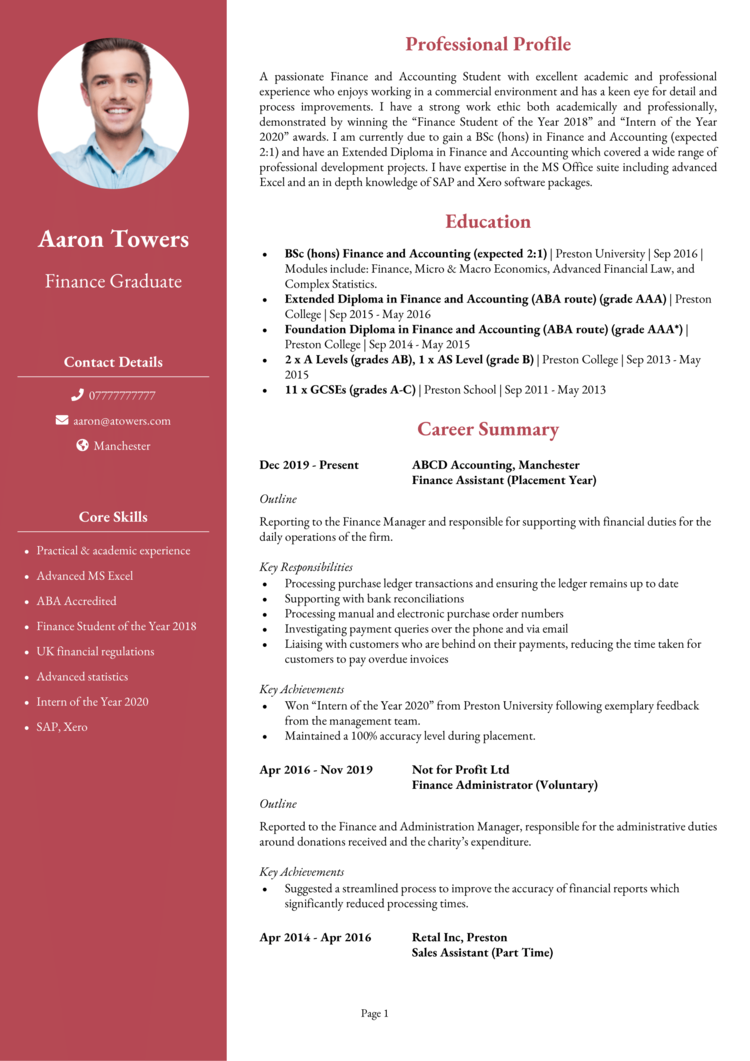
Law Student CV example
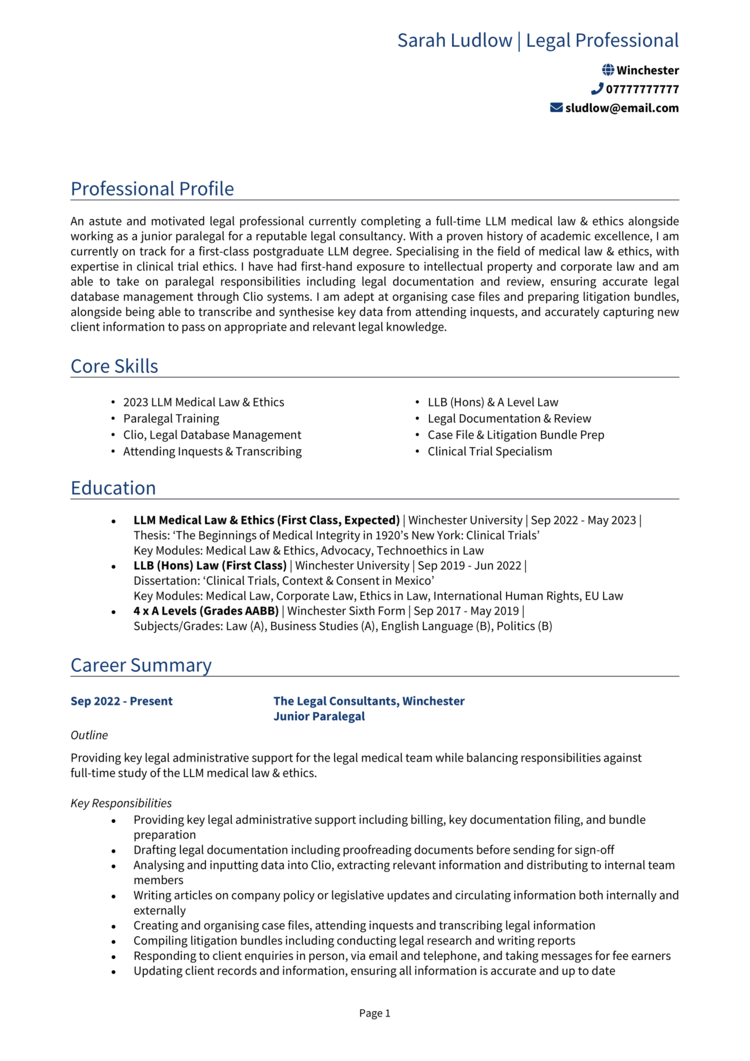
Marketing Graduate CV example
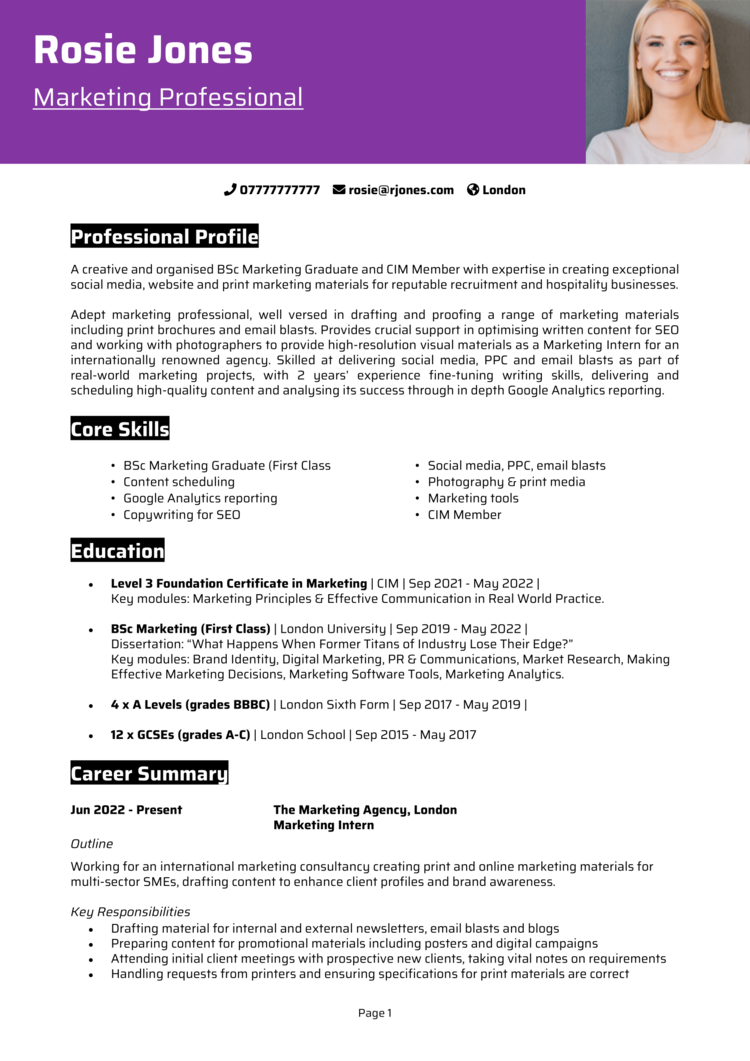
Master’s Student CV example
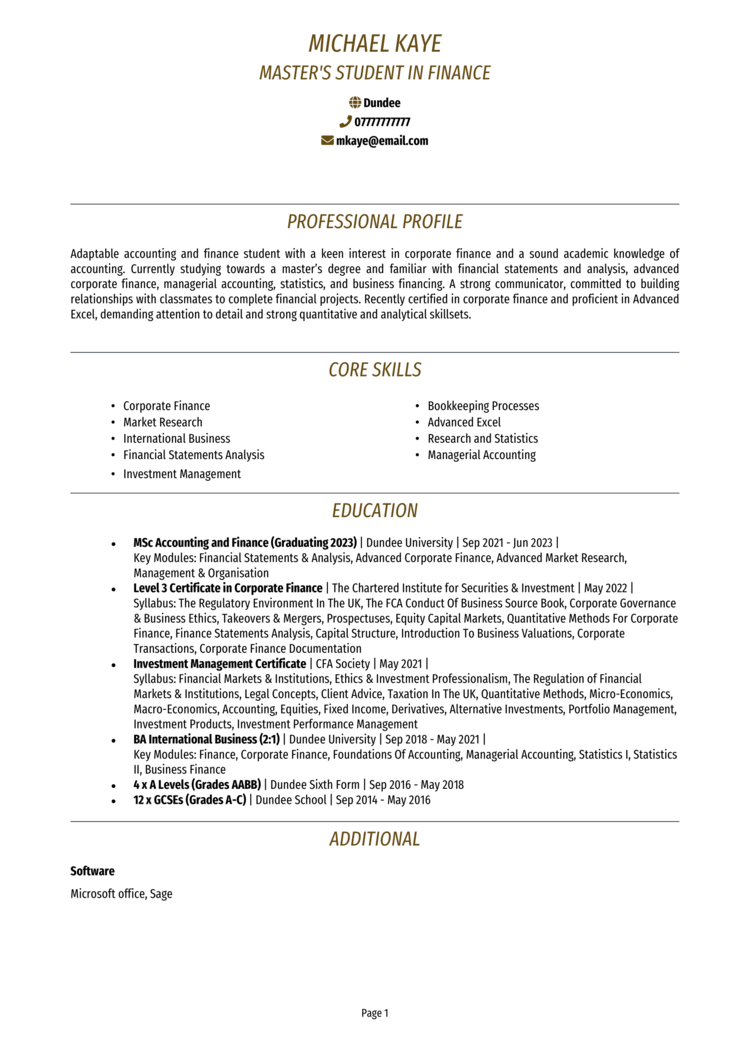
PhD Graduate CV example
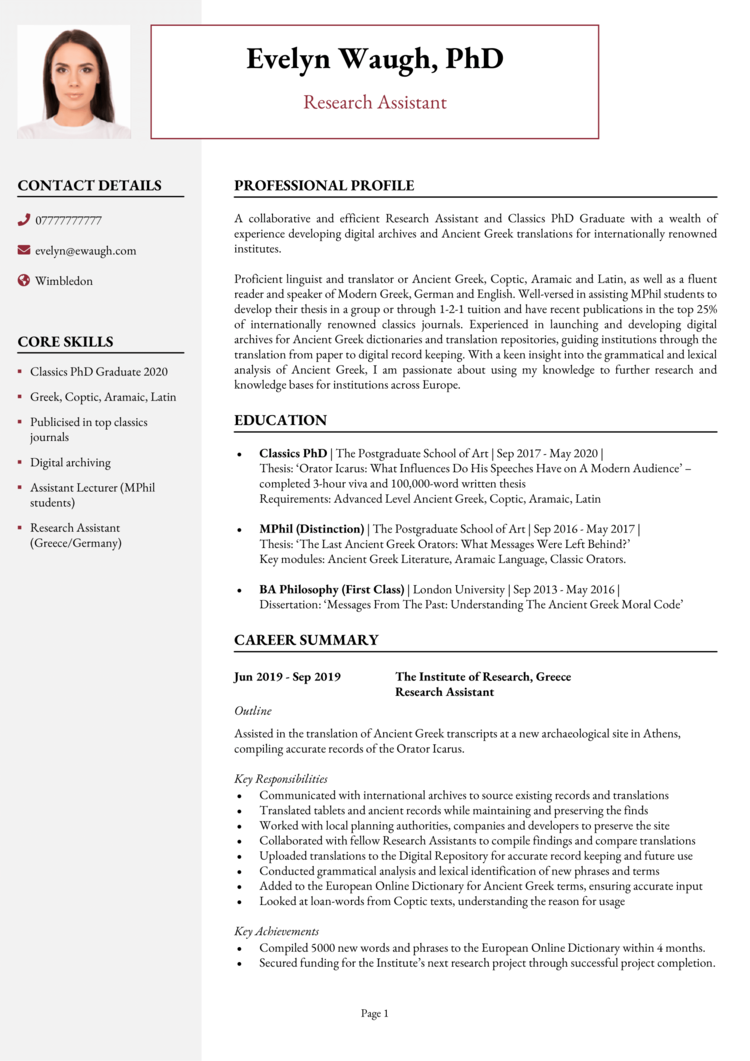
Postgraduate CV example
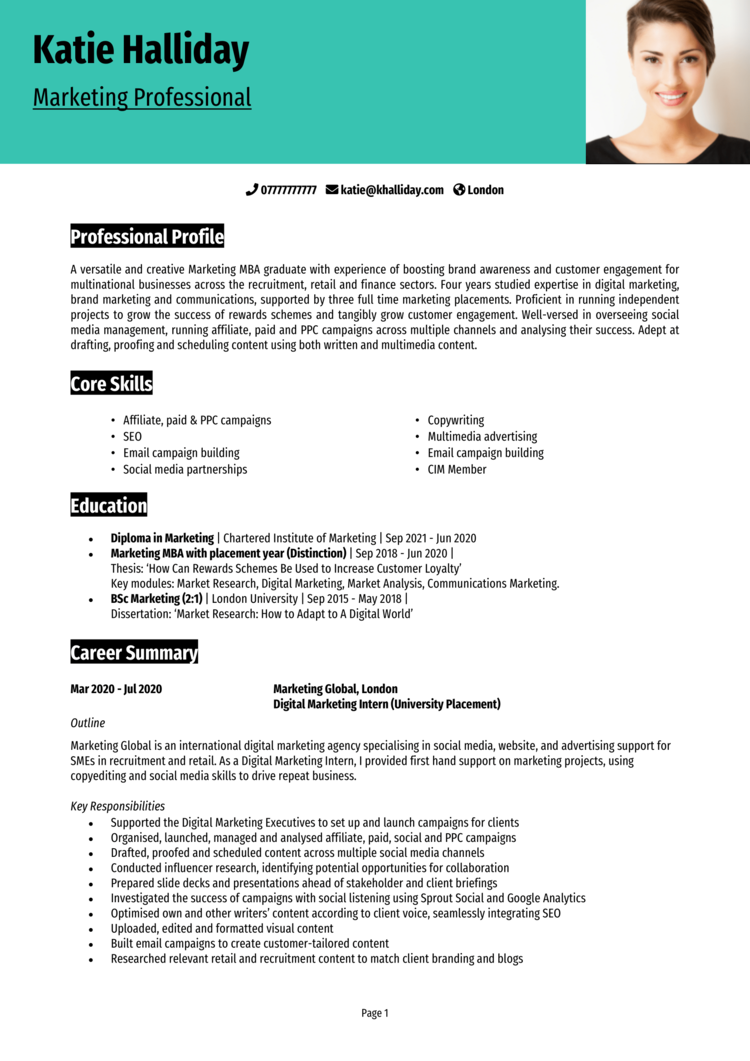
Psychology Graduate CV example

How to write your Graduate CV
Learn how to create your own interview-winning Graduate CV with this simple step-by-step guide.
Starting your career can feel overwhelming, but a well-crafted CV is the perfect way to get noticed by recruiters. Your Graduate CV should reflect your academic accomplishments, extracurricular involvement, and transferable skills.
The below guide will show you how to highlight your strengths, even if you’re short on work experience. It’ll walk you through writing an application that makes employers eager to meet you, even if this is your first CV.
What is the correct structure for your Graduate CV?


A Graduate CV needs a structure that’s clear and focused on your potential. It needs to be as polished as that final dissertation you swore you’d never finish – but without the all-nighters.
Here’s how to structure your Graduate CV:
- Name and contact details – Place these personal details at the top so employers can contact you easily. Including a photo is always optional.
- Profile – Also called a personal statement, this is where you introduce yourself, your career aspirations, and all your relevant experience.
- Core skills – Highlight workplace abilities like teamwork, problem-solving, or communication, and when you’ve demonstrated them.
- Education – The most important section for a graduate, this should include detailed information about your most recent qualifications, including relevant modules, essays, and coursework.
- Work experience – Include any part-time jobs, internships, or voluntary work. List in reverse chronological order, but prioritise relevance.
- Additional info – Use this section to showcase hobbies and interests, awards, or extracurricular activities that reflect your personality and potential.
How should you format a Graduate CV?


Your CV should be as crisp and organised as your favourite lecture notes – yes, the ones you actually took time to colour-code. Remember, even the brightest graduates can lose out if their CV is cluttered or hard to read, so avoid these common formatting mistakes to give yourself the best chances.
Here’s how to format your Graduate CV:
- Bullet points – Break down information for quick reading and clarity. Consider some icons for extra flair.
- Divide sections – Use clear headings to guide the recruiter through your CV.
- Use a clean font – Opt for readability with a simple font and consistent layout.
- Keep it the right length – Keep your CV no more than 2 pages long, providing enough space to showcase your skills and experience.
Graduate CV profile


Your CV profile, also known as a personal statement, is the elevator pitch that lands you the job. Except here, you’ve got a no more than 8 lines instead of 30 seconds, so make them count.
For a Graduate CV, this is where you showcase your academic achievements and transferable skills while giving recruiters a glimpse of your career aspirations. Mention your relevant work experience: paid and unpaid, and detail why it is you’re looking at the roles you’re applying for.
Graduate CV profile examples
Profile 1
Motivated Business Graduate with a 2:1 degree in Business Management from the University of Birmingham. Skilled in market analysis, project coordination, and data interpretation, with experience gained through internships in the retail and financial sectors. Seeking to apply analytical and organisational skills in a fast-paced business environment.
Profile 2
Organised Engineering Graduate with a First-Class degree in Mechanical Engineering from Imperial College London. Proficient in CAD software, problem-solving, and project management, with hands-on experience through academic projects and an internship in the automotive industry. Looking to contribute technical expertise to innovative engineering solutions.
What to include in your Graduate CV profile
Here are some tips on what to include in your Graduate CV profile:
- Where you’ve studied – Mention the university or institution where you earned your degree.
- Your top qualifications – Highlight your degree, relevant coursework, or academic accolades. If you’ve not quite graduated, mention your predicted grades here.
- Key skills – Include transferable skills like research, problem-solving, or teamwork.
- Work experience – Even if you’re lacking here, don’t worry – mention whatever you can.
- Career aspirations – Briefly state the type of role or industry you’re looking to enter.
- Projects or extracurriculars – Reference experiences that demonstrate initiative or leadership.
Core skills section


Your core skills section is a quick headline stating your abilities, giving recruiters an overview of what you bring to the table.
Draw on transferable skills gained from your time as a student, part-time jobs, or extracurricular activities. Time management from cramming for exams and teamwork from group projects definitely count as transferable skills!
Focus on hard, tangible skills, and avoid generic statements like “good problem solver” – instead, give examples of when you demonstrated these abilities. Tailor these to the job description, focusing on the things most relevant to the role.
Struggling to write your graduate CV?
Try our quick and easy CV builder, it has tons of pre-written content for graduates, a range of professional templates, and expert tips to help you create a winning graduate CV in minutes.
Most valuable skills for a Graduate CV
- Research and Analysis – Conducting detailed investigations and synthesising data into actionable insights.
- Time Management – Balancing academic work with extracurricular commitments and deadlines.
- Presentation Skills – Delivering engaging and informative presentations to varied audiences.
- Technical Proficiency – Proficient in tools like Microsoft Office, data analysis software, or coding languages.
- Team Collaboration – Working effectively in group projects or committees to achieve shared goals.
- Creative Problem-Solving – Developing innovative solutions for academic and real-world challenges.
- Leadership – Leading teams or societies to coordinate events or complete projects.
- Report Writing – Preparing clear, structured reports on complex topics.
- Adaptability – Thriving in new environments and quickly learning new skills.
Education section


The education section is the most critical part of your Graduate CV, as it highlights your academic foundation. Include your well-earned degree, key modules, dissertation topics, and any relevant coursework.
Provide detail on the most relevant and recent qualifications, but as you’re a graduate, summarise things like your GCSEs. List your qualifications in reverse chronological order, starting with the most recent.
Example education sections
Education
Distinction MSc Data Science | University College London (UCL) | 2022–2023
Modules included Big Data Analytics, Machine Learning, and Data Visualisation. Completed a thesis on predictive modelling for renewable energy systems, earning a distinction.
First Class BSc (Hons) Business Management | University of Leeds | 2020–2023
Modules included Strategic Management, Data Analytics, and Marketing Principles. Completed a dissertation on the impact of digital transformation on small businesses, achieving a distinction.
3x A-Levels (A-B) | Leeds Sixth Form College | 2018–2020
9x GCSEs (A*-D) | Leeds High School | 2016–2018
Education
Upper Second Class BA (Hons) English Literature | University of Manchester | 2020–2023
Modules included Contemporary Fiction, Creative Writing, and Literary Theory. Completed a dissertation analysing representations of identity in postcolonial literature, receiving a high 2:1.
3x A-Levels | Manchester Sixth Form College | 2018–2020
English Literature (A), History (B), Sociology (B)
10x GCSEs (A-C) | Manchester High School | 2016–2018
What to include in your education section
For each qualification, add the following info:
- Qualification & organisation – What subject you studied and at which university.
- Dates studied – Note the date you began and the date you earned the qualification.
- Extra details – For your most recent and relevant qualifications, add some details about your studies to showcase some of the valuable skills and experience you gained. This could be projects, modules, coursework, essays, or anything else that could highlight relevant talents for the jobs you are applying for.
Top qualifications to showcase on a Graduate CV
- Bachelor’s Degree – A foundational degree that demonstrates subject knowledge and academic dedication.
- Master’s Degree – Advanced study showcasing specialised expertise.
- Microsoft Office Specialist (MOS) – Certification in advanced use of Microsoft Office tools.
- Google Data Analytics Certificate – Practical training in data collection, analysis, and presentation.
Outlining your work experience


Your work experience section is where you prove your employability, even if you’ve only had part-time jobs or internships: you should add as much experience as possible. Highlight the responsibilities you’ve handled and the skills you’ve gained from each role.
List your roles in reverse chronological order, but make exceptions for particular relevant work placements from years ago. And if you have no work experience yet, don’t panic – university projects, internships, and volunteering all count here (even the Saturday job you did as a teenager!)
How to structure jobs

- Outline – Provide an overview of the institution, your role, and the scope of your responsibilities.
- Responsibilities – Highlight tasks like customer service, research assistance, or event coordination. Use action verbs like “supported,” “organised,” or “delivered.”
- Achievements – Showcase outcomes, such as meeting deadlines, exceeding expectations, or improving processes. Include numbers or figures wherever possible to make an impact.
Example jobs for Graduate
Business Intern | University of Leeds
Outline
Completed a business consultancy project as part of a final-year module, collaborating with a local SME to improve operational efficiency and strategy alignment.
Responsibilities
- Conducted detailed market analysis and competitor benchmarking to identify growth opportunities.
- Developed a comprehensive business plan that included financial forecasts and marketing strategies.
- Presented findings to senior stakeholders, receiving commendation for actionable insights.
- Collaborated with a team of five peers, ensuring clear communication and task delegation.
- Prepared a detailed final report, achieving one of the top marks in the module.
Achievements
- Increased the client company’s operational efficiency by recommending process improvements.
- Awarded the Best Consultancy Project accolade in the final year.
- Received positive feedback from the client for actionable, data-driven solutions.
Research Intern | King’s College London
Outline
Participated in a three-month summer research internship, assisting in a study on workplace psychology and employee engagement.
Responsibilities
- Designed and distributed surveys to gather quantitative data from participants.
- Conducted statistical analysis using SPSS and R to identify key trends and correlations.
- Compiled research findings into a detailed report, contributing to the final publication.
- Presented results during a departmental seminar to faculty and fellow students.
- Worked closely with the research team to ensure ethical guidelines were adhered to throughout the project.
Achievements
- Improved survey response rates by 20 percent through effective participant engagement strategies.
- Contributed to a research paper that was later published in a peer-reviewed journal.
- Received positive feedback from the supervisor for excellent analytical and organisational skills.
Additional info


For graduates, the additional info section is a golden opportunity to make your CV stand out, especially if you’re lacking in work experience.
Use this section to showcase extracurricular activities, personal achievements, or hobbies that highlight transferable skills or align with the role you’re applying for.
Good additional info for Graduate
- Hobbies and interests – Highlight activities that show traits like creativity, leadership, or dedication. If it’s a writing role you’re applying for, mention any blogs you run. For a team-based role, mention competitive sports, for example.
- Extracurricular achievements – Mention any involvement in university societies, competitions, or awards received.
- Volunteer work – Include community service or charity work that demonstrates your values and initiative.
- Language skills – If you’re going for a job that’d benefit from multi-lingual skills, definitely mention those.
- Side projects or personal initiatives – Talk about any independent learning, certifications, or projects you’ve undertaken to build skills.
Additional info example
Additional info
Hobbies and interests
- Creative writing – Honing storytelling and editing skills by writing and publishing short stories.
- Running my own fashion blog – Developing SEO and social media marketing expertise to achieve over 500 monthly readers.
- Volunteering – Help organise weekly food drives, improving my event coordination and interpersonal skills to help the local community.
Software
- Microsoft Office – Used Excel to create a dynamic financial tracking sheet to aid in budget analysis.
- Adobe Illustrator – Designed promotional graphics for a charity event, increasing online engagement by 20%
Languages
- English – Conducted presentations and prepared professional reports during work placements.
- Hindi – Assisted with customer service in a multilingual retail environment, improving customer satisfaction.





